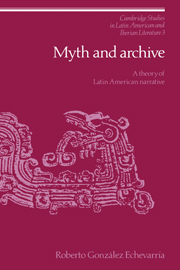
-
Select format
-
- Publisher:
- Cambridge University Press
- Publication date:
- 12 September 2009
- 28 September 1990
- ISBN:
- 9780511527197
- 9780521306829
- 9780521023993
- Dimensions:
- (228 x 152 mm)
- Weight & Pages:
- 0.49kg, 260 Pages
- Dimensions:
- (228 x 152 mm)
- Weight & Pages:
- 0.396kg, 260 Pages
You may already have access via personal or institutional login
Book description
This book offers a theory about the origin and evolution of the Latin American narrative, and about the emergence of the modern novel. It argues that the novel developed from the discourse of the law in the Spanish Empire during the sixteenth century, while many of the early historical documents concerning the New World assumed the same forms, furnished by the notarial arts. Thus, both the novel and these first Latin American narratives imitated the language of authority. The book explores how the same process is repeated in two key moments in the history of the Latin American narrative. In the nineteenth century, the model was the discourse of scientific travellers such as von Humboldt and Darwin, while in the twentieth century, the discourse of anthropology - the study of language and myth - has come to shape the narrative. Professor González Echevarría's theoretical approach is drawn from a reading of Carpentier's Los pasos perdidos, and the book centres on major figures in the tradition such as Columbus, Garcilaso el Inca, Sarmiento, Gallegos, Borges and Garcia Marquez.
Reviews
"...a book that will have lasting value because it opens new exegetic horizons for the study of Latin-American narrative." Antonio Fama, Canadian Review of Hispanic Studies
Contents
Metrics
Full text views
Full text views help Loading metrics...
Loading metrics...
* Views captured on Cambridge Core between #date#. This data will be updated every 24 hours.
Usage data cannot currently be displayed.
Accessibility standard: Unknown
Why this information is here
This section outlines the accessibility features of this content - including support for screen readers, full keyboard navigation and high-contrast display options. This may not be relevant for you.
Accessibility Information
Accessibility compliance for the PDF of this book is currently unknown and may be updated in the future.


